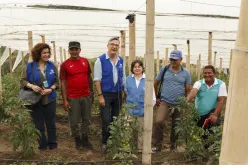Tragedies have the particular distinction of steering us back to basic and fundamental truths. As COVID-19 has humbled the world, transformed every aspect of our lives, and exacerbated existing challenges, it has also shown us indomitable resilience and moving displays of civic virtue. Demonstrations of solidarity have confirmed that consideration towards one another invariably work, affirming that goodwill is ultimately far more contagious than the novel virus[1].
In reflecting on people-centred solutions, whether to confront the cumulative impacts of the pandemic, or its indispensability in the fulfillment of the UN Sustainable Development Goals (SDGs), we realize how elusive, yet fundamental stakeholder participation is. How does one establish lasting mechanisms to encourage and consolidate civic engagement? How does one engender a culture of common purpose towards a unifying goal, whether to fulfill national priorities or global aspirations? In this context, volunteerism, in all its different forms is one of the most effective means to deliver people-centred solutions and abide by our development agenda’s tenet: "of the people, by the people and for the people".
So, what does “move towards more people-centered solutions” mean in practice? The answer is surprisingly straightforward. It resides in the opportunities created for citizens to meaningfully engage in the issues affecting them. The more engagement is secured, the more impactful will development initiatives be. From this perspective, volunteering is perhaps the greatest and most underutilized asset in development assistance today. The integration of volunteer-based solutions, and the 1,276 UN Volunteers deployed in the region in 2020 are committed to illustrating this basic premise to our UN partners. By incorporating the potential of volunteering in their mandates and building resilient and inclusive communities as a result, the incalculable impact and magnitude of the challenges we face can be surmounted – leaving no one behind. --Lita Paparoni, Regional Manager, Latin America and the Caribbean
In the Latin America and the Caribbean region, examples abound as volunteers have joined to provide solutions and support where needed. In Venezuela, diverse volunteer-involving organizations, as well as spontaneous volunteer groups, self-organized to respond to local needs during the humanitarian crisis using various platforms to promote dialogue on COVID prevention and care.
With the support of these civil society and community groups, UNFPA colleagues have been able to disseminate its reproductive and sexual health strategy during the pandemic. More than 280 individuals invested their time, local knowledge and motivation to support UNFPA’s "House-to-House" approach, resulting in more than 26,900 people reached through this replicable peer-to-peer support.[1]
Solutions are powered by people
Solutions can be amplified if the will of civil society is harnessed in a timely manner. In Bolivia, for example, UNICEF engages 60 volunteers – experts in psychology and mental health – to provide psycho-emotional support through the Safe Family call centre. Between the call centre’s launch on 1 April 2020 and August 2020, these professionals attended to 16,223 calls. Established in record time, the center underscores how the power of volunteerism can enable rapid intervention and access to all.
Partnerships with professional associations, universities and companies are also key to this win-win collaboration. For some participants, it was their first volunteer experience; for others, it was a unique and rewarding opportunity to lend support in their native language (Aymara and Quechua), as indigenous languages comprise one of the call centre’s specializations.[2]
Lasting change is based on forging collective bonds
Promoting citizen participation through all types of volunteering - both formal and informal, on-site or remote, for mutual aid or for providing services, campaigning, etc. - has a unique and essential worth that should be highlighted, recognized and valued; that of building a social legacy.
In Peru the government has set as a goal for its Bicentennial anniversary to build the largest volunteer corps in the country’s history as a means to face its most critical challenges. As part of the COVID-19 response efforts, 7,000 Peruvians volunteered, dedicating more than 500,000 hours to calls for monitoring the health of 100,000 elderly and disabled individuals. Efforts are now being directed towards evolving priorities, including guidance to families in need on how to apply for available subsidies, and related information on preventing COVID-19 transmission.[3]
The transformational change that the action of volunteering provides to individuals (including skills such as emotional intelligence, leadership, openness to interdisciplinarity and collaboration) is truly the pilar that enables social cohesion, unity, and common purpose to flourish. Volunteering, characterized by active engagement and purposeful commitment, is thus a core principle of effective local governance, and vital to achieving inclusive and sustainable development.
[1] Five UN Volunteers are currently involved in this initiative, as part of the UNFPA team in Venezuela. Read more here.

